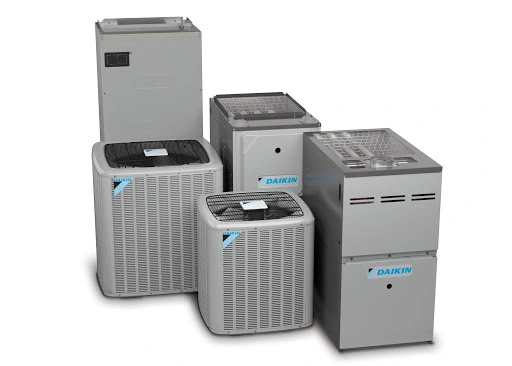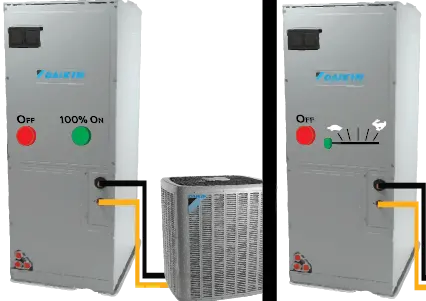Inverter Heat Pump: What makes it different and who is it for?
Most of us interact with our home HVAC system by turning it off and on and changing the filter. When an HVAC salesperson lists all the options, we usually choose the cheapest option or the one with the highest efficiency rating.
The technical speech and jargon just wash over us because it means nothing to us. What is an inverter heat pump, anyway?
Our hope at Advantage is to reduce the confusion around HVAC equipment and boost your knowledge and confidence. If you feel like you can confidently direct the conversation with your HVAC sales professional, then we’ve done our job.
You shouldn’t feel like you’re just accepting a recommendation with no information. And you definitely shouldn’t feel like the sales professional is making your decision for you.
In this post, we’ll explain what an inverter heat pump is, what makes it special, and give you details that you can use to direct the conversation when purchasing a new HVAC system.
What is a Heat Pump?
A heat pump is an HVAC system that transfers heat rather than generating it. Unlike a furnace that burns fuel to create heat, a heat pump extracts heat from the outside air (even in cold weather) and transfers it indoors.
In cooling mode, a heat pump works like an air conditioner by extracting heat from inside your home and expelling it outside. This dual functionality makes heat pumps one of the most energy-efficient heating and cooling solutions available today.
What is an Inverter Heat Pump?
An inverter heat pump is a heat pump that can operate at multiple speed settings. They use a piece of technology, sometimes called an inverter drive or inverter compressor, to operate at variable speeds instead of just turning on and off.
Depending on the manufacturer and their marketing, they may also call this style of heat pump a variable-speed or multi-speed system. The many names given to this type of HVAC equipment have led to some confusion. At Advantage, we call it a Smart System, since it can make smart decisions based on sensor inputs.
In this post, we’ll try to keep it simple and only call it an inverter heat pump or a Smart System.
Is an Inverter Heat Pump a Smart Heat Pump?
Yes, an inverter heat pump is often considered a smart heat pump because it continuously adjusts its performance to match your home’s heating and cooling needs. Unlike traditional systems that turn on and off in cycles, an inverter heat pump operates at varying speeds, optimizing efficiency and comfort.
Some models also integrate with smart thermostats, allowing homeowners to monitor and control their energy usage remotely. This combination of technology ensures consistent temperatures and lower energy bills.
Is a Heat Pump Better With or Without an Inverter?
A heat pump is significantly better with an inverter. Here’s why:
- Higher Efficiency – Inverter heat pumps consume less energy by avoiding frequent start-stop cycles.
- Consistent Comfort – Variable speeds ensure even heating and cooling without sudden temperature fluctuations.
- Lower Energy Bills – Reduced power consumption leads to noticeable energy savings over time.
- Longer Lifespan – Since it doesn’t experience the stress of constant starts and stops, an inverter heat pump lasts longer with fewer repairs.
While inverter heat pumps tend to have a higher upfront cost, the long-term benefits in efficiency and durability make them the superior choice.
How Do Inverter Heat Pumps Work?
An inverter heat pump works by adjusting the compressor speed in real-time based on the heating or cooling demand. Instead of turning off and on like a traditional system, the inverter compressor operates continuously, making slight adjustments to maintain the desired temperature efficiently.
Variable-Speed Blowers vs. Variable-Speed Compressors
- Variable-speed blowers are located in the indoor unit and adjust airflow based on comfort levels. They ensure even air distribution and better humidity control.
- Variable-speed compressors are part of the outdoor unit and control the heating or cooling output. These work in tandem with blowers to optimize energy use.
How Long Do Inverter Heat Pumps Run Continuously?
Unlike traditional HVAC systems that cycle on and off, inverter heat pumps run for extended periods—sometimes continuously—at low power levels. This approach maximizes efficiency and ensures stable indoor temperatures while using minimal energy.
What Makes a Heat Pump Different from a Furnace?
Heat pumps and furnaces provide heating but function differently:

Heat pumps operate differently from a furnace at its core. A furnace uses a fuel source to generate heat using a chemical reaction or electricity. A heat pump uses refrigerant to absorb heat from one side of the system and expel that heat from the other side.
A heat pump can pull heat from outside and pump it into your home in winter. They can also pull heat from inside your home and expel it outside. This means that heat pumps can also do the same function as an air conditioner.
In order to push air through the system, a heat pump will still need some sort of air handler. That could be a separate air handler unit or it can work with a furnace connected to ductwork.

What is the Difference Between a Heat Pump and an Inverter Heat Pump?
A standard heat pump operates at fixed speeds—either full power or off. When the thermostat tells the heat pump to change the temperature in the room, it turns on at full speed. Then shuts off once it reaches or goes over the desired temperature.
That’s like having a car that only goes 100 miles per hour if it’s not stopped. It’s not very useful if you need to slow down through a school zone.
On the other hand, an inverter heat pump can go fast, slow, or at any speed in between to match the home’s needs. The inverter technology allows it to turn on at full speed and then slow down to maintain temperature or start slow and speed up. This ability to run at different speeds allows an inverter system to:
- Use less energy
- Maintain consistent temperatures
- Extend the lifespan of the compressor
- Operate more quietly
This makes it like having adaptive cruise control or a sixth sense that allows you to hit the gas just right and always be going the exact speed limit.

What are the Benefits of an Inverter Heat Pump?
The way an inverter heat pump provides heat offers several benefits over a furnace. The ability to adjust the speed at which it operates gives it several benefits over a fixed heat pump. We’ll start by discussing the financial benefits that you’d see as a customer before getting into the other benefits it offers.
Energy Savings
Inverter heat pumps are so efficient that they can pay for themselves if you use them as a long-term solution. Homeowners often see a reduction in their electricity bills after making the switch.
How? Inverter heat pumps are designed for energy efficiency. It’s often three times more efficient than a regular furnace.
Most inverter heat pumps have a Coefficient of Performance (CoP) between 3 to 5. That means for every 1 kilowatt of power it uses, it will produce 3 to 5 kilowatts of heat.
A high-end furnace has an efficiency between 95-98%, but an inverter heat pump is still three times more efficient.

Even when compared to regular heat pumps, they often save 10-30% more each month on electric bills because they can adjust speed.
A regular heat pump uses the most power to turn on. It has to turn on several times throughout the day to maintain a temperature since the ambient air will affect the air in your home once it turns off. An inverter heat pump will slow down to maintain temperature. This one longer cycle will use less energy than the fixed heat pump turning off and on.
In both cases, you save every month on your energy bill.
The exact amount you could save would depend on your climate and the frequency your heat pump turns on. Curious how much a heat pump can save you? Explore your savings for free today.
Long-Lasting Equipment
Inverter heat pumps typically last 20–25 years, whereas:
- Fixed-speed (traditional) heat pumps last 15–20 years due to frequent on/off cycling.
- Gas furnaces last 15–30 years, depending on maintenance and fuel type.
Why? Any HVAC system suffers the most wear and tear when it first turns on. The parts move, and an electric current activates everything that needs to activate. This jolt during activation wears down parts over time. Short cycles and constant on-and-off activations can destroy pieces of equipment.
Because inverter heat pumps run continuously at variable speeds instead of cycling on and off, they experience less wear and tear than other systems. You pay for fewer repairs, go through fewer materials, and avoid replacing your system often.
Environment-Friendly
Using an inverter heat pump reduces your carbon footprint by lowering energy consumption. Plus, because they last longer, they reduce waste from replacements and repairs.
If you are looking for a sustainable and eco-friendly option, then mention that to your HVAC sales professional.

Comfort Improvements
An inverter heat pump offers several benefits in terms of at-home comfort:
- More Consistent Temperatures – Avoids the hot and cold swings of traditional systems
- Quieter Operation – Runs at low speeds most of the time, minimizing noise.
- Flexible Installation Options – Available in both ducted and ductless models.
-
Less Space Needed – Runs efficiently in a compact outdoor unit, freeing up indoor space.
Humidity Control
Inverter heat pumps regulate humidity more effectively than traditional HVAC systems because they run longer at lower speeds, allowing more moisture to be removed from the air. This helps maintain optimal indoor air quality, especially in humid climates.
Improved Air Quality
Since inverter heat pumps run continuously at lower speeds, they circulate air more frequently through filters, reducing airborne pollutants and allergens.
Daikin Inverter Heat Pump
Daikin is one of the leading manufacturers of inverter heat pumps. Their models offer high energy efficiency, smart controls, and durability. Some Daikin units also qualify for rebates and incentives, making them an excellent choice for energy-conscious homeowners. Get a free quote for a Daikin system today.
When to Choose an Inverter Heat Pump
You should consider an inverter heat pump if:
- You want lower energy bills and better efficiency.
- You experience fluctuating temperatures with your current HVAC system.
- You want a quieter, long-lasting heating and cooling solution.
- You live in an area where winters are mild to moderate but still need heating.
Inverter Heat Pump Installation in Oregon
At Advantage Heating, we specialize in installing high-efficiency inverter heat pumps tailored to your home’s needs. Whether you’re replacing an outdated system or installing one for the first time, our team ensures a seamless process with professional expertise.
Takeaway
If you’re looking for a smart, energy-efficient, and comfortable heating and cooling solution, an inverter heat pump is the best choice. Contact Advantage Heating today to learn more about how an inverter heat pump can work for your home.







